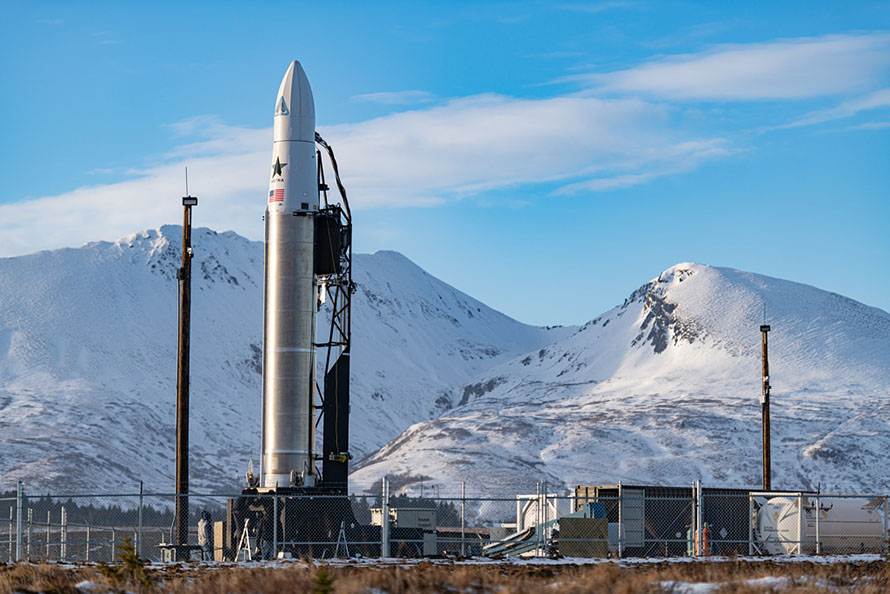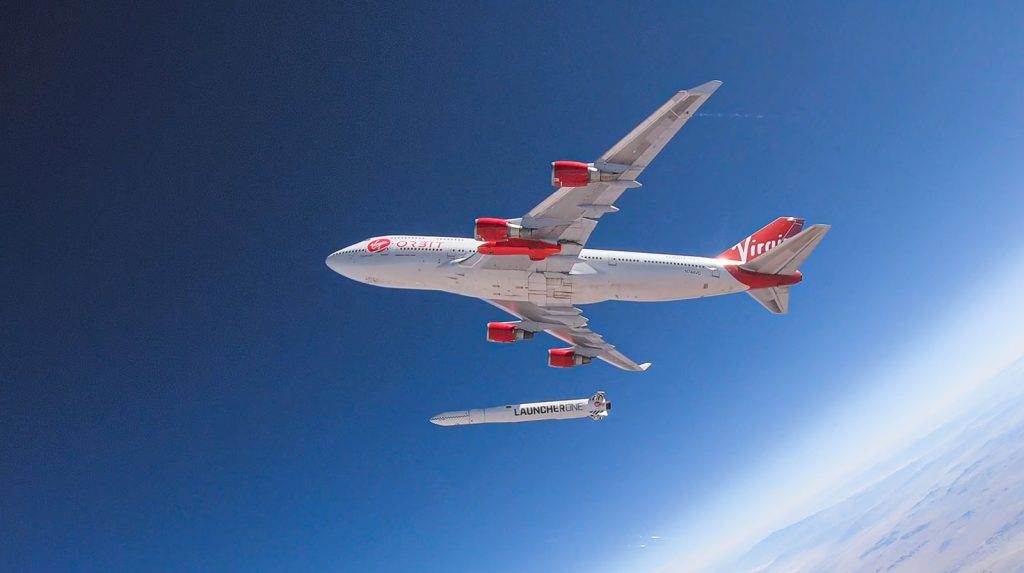
© by Dale Skran, NSS Chief Operating Officer
Image: Launch from Cosmic Girl, courtesy Virgin Orbit
In terms of U.S. launch companies, SpaceX is lapping the field, and Rocket Lab holds out promise—at least in terms of number of launches (not mass to orbit), Rocket Lab matched ULA with 5 successful launches. But what of those nipping at the heels of the leaders? Two of them at long last made orbit in 2021: Virgin Orbit and Astra Space.
Virgin Orbit, a spin-off of Virgin Galactic, costs about $12M per launch and starts with a drop from a modified 747 jet named Cosmic Girl. The rocket (named “Launcher One”) can loft 300kg to sun-synchronous orbit (SSO) and 500kg to low Earth orbit (LEO), has two stages and uses RP-1/LOX for fuel. An initial test in 2020 failed, but 2021 saw two orbital flights:
- January 17 – deployed 10 cubesats to LEO for NASA.
- June 30 – first commercial usage of Launcher One, lofting 7 cubesats to orbit. Customers included the U.S. Defense Department (4), SatRevolution (2), and the Royal Netherlands Air Force (1).
The main advantage Virgin Orbit offers is that since Launcher One is air-dropped from a 747, the “launch pad” can be moved to just about anywhere to achieve different orbits and inclinations. This service may cost more, but flexibility can be a competitive advantage. The only current competitor is the Northrop Grumman air-launched Pegasus, but at $40M a pop for the same capacity as Launcher One the Pegasus is the past, not the future, of air-launched vehicles.
Virgin Orbit is also following the “Beat SpaceX at its own game” template by investing:
- $30M in the Series B round for SatRevolution (imaging satellite constellation builder), one of their launch customers.
- A 17.5% stake in Hypersat (a Virginia Based geospatial analytics company), a future Virgin Orbit customer, for an undisclosed amount.
- An undisclosed equity state in Horizon Technologies (satellites for maritime domain awareness), another future Virgin Orbit Customer.
- A 14.7% stake in Sky and Space Global (an Australian comsat constellation builder) for an undisclosed amount, still another Virgin Orbit future customer.
- $5M in Arqit (a British quantum computing company) when it went public via a special purpose acquisition company (SPAC), yet another future Virgin Orbit customer.
The general plan for competing with SpaceX appears to be:
- Build a working launch vehicle.
- Go public, usually via a SPAC.
- Invest in companies that need launch services using cash and/or stock.
- Launch the satellites those companies build.
Having said all that, it remains to be seen if Virgin Orbit can compete successfully with the following:
- SpaceX rideshare services [See my 2021 SpaceX roundup here].
- Rocket Lab [See my 2021 Rocket Lab roundup here].
- Up and comers like Firefly and Relativity Space expected to reach orbit soonish.
- New foreign competitors.
- Astra Space.
Speaking of Astra Space, they made it to orbit in 2021 as well. After a fairly large number of unsuccessful tests, Astra hit orbit on November 20, 2021, using the Astra Rocket 3.3 carrying a demonstration payload for the U.S. Space Force. The August 28th failure was especially exciting as an engine failed near liftoff but robust avionics kept the rocket moving laterally until it could rise, quite an amazing thing to see but it was not enough to make orbit. Rocket 3.3 lofts up to 150 kg to SSO using a two-stage RP-1/LOX system.

Astra Space rocket at its base in Kodiak, Alaska.
The main claim to fame of Astra Space is a super-cheap, highly manufacturable expendable vehicle. Although it has only one orbital launch to its credit, Astra is public on the NASDAQ as ASTR with a market cap of 2.13B. Perhaps of more interest, on November 4th, Astra Space filed an application with the FCC to deploy a constellation of 13,600 satellites to provide broadband services. This seems like a big leap for a small company, and as usual SpaceX is WAY ahead, but it is certainly one approach to maintaining investor interest. Astra Space may be positioning itself for a “merger of equals” with a company that is in need of cheap launch for their own mega-constellation.
It’s a bit early to see how this all shakes out, but for the moment Virgin Orbit and Astra Space are officially members of the “Orbit Club”.
Post Script: You may be wondering why I am not covering the various Chinese entrants, such as the December 7th 2nd launch of the Galactic Energy Ceres 1 rocket. This rocket can put up 300 kg to a polar orbit. There are several reasons:
- These are, so far, military derived solid fueled rockets, which are closer to “dumping” than innovation.
- They are unlikely, for political reasons, to have much impact on the global launch market.
- Their status as “commercial” companies remain debatable.
Having said all that, if and when the Chinese start flying more interesting rockets to orbit, I’ll be taking a look at them.



















